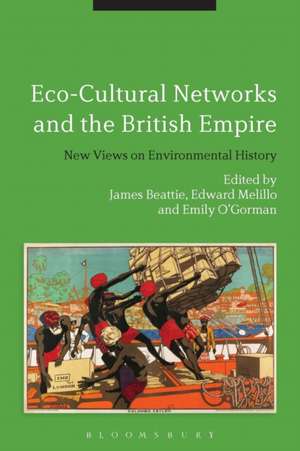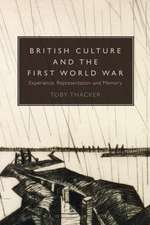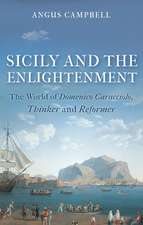Eco-Cultural Networks and the British Empire: New Views on Environmental History
Editat de Dr James Beattie, Dr Edward Melillo, Dr Emily O'Gormanen Limba Engleză Paperback – 29 iun 2016
| Toate formatele și edițiile | Preț | Express |
|---|---|---|
| Paperback (1) | 259.79 lei 6-8 săpt. | |
| Bloomsbury Publishing – 29 iun 2016 | 259.79 lei 6-8 săpt. | |
| Hardback (1) | 776.16 lei 6-8 săpt. | |
| Bloomsbury Publishing – 17 dec 2014 | 776.16 lei 6-8 săpt. |
Preț: 259.79 lei
Preț vechi: 332.39 lei
-22% Nou
Puncte Express: 390
Preț estimativ în valută:
49.72€ • 51.71$ • 41.04£
49.72€ • 51.71$ • 41.04£
Carte tipărită la comandă
Livrare economică 14-28 aprilie
Preluare comenzi: 021 569.72.76
Specificații
ISBN-13: 9781474294393
ISBN-10: 1474294391
Pagini: 344
Ilustrații: 20 illus
Dimensiuni: 156 x 234 x 18 mm
Greutate: 0.48 kg
Ediția:NIPPOD
Editura: Bloomsbury Publishing
Colecția Bloomsbury Academic
Locul publicării:London, United Kingdom
ISBN-10: 1474294391
Pagini: 344
Ilustrații: 20 illus
Dimensiuni: 156 x 234 x 18 mm
Greutate: 0.48 kg
Ediția:NIPPOD
Editura: Bloomsbury Publishing
Colecția Bloomsbury Academic
Locul publicării:London, United Kingdom
Caracteristici
Draws on recent studies in environmental history, post-colonial theory and the history of science
Notă biografică
James Beattie is Senior Lecturer at the University of Waikato, New Zealand. He is the author of Empire and Environmental Anxiety (2011) and a founding co-editor of the journal International Review of Environmental History. Edward Melillo is Assistant Professor at Amherst College, USA. He teaches courses on global environmental history and is the author of Strangers on Familiar Soil.Emily O'Gorman is an environmental and cultural historian in the Department of Environment and Geography at Macquarie University, Australia. She has published in a range of journals and is the author of Flood Country: An Environmental History of the Murray-Darling Basin (2012). She is an Associate Editor of the journal Environmental Humanities.
Cuprins
Foreword John M. MacKenziePart I - Framing Imperial and Regional Networks of Nature1. Eco-Cultural Networks in the British Empire, 1860-1940 James Beattie (University of Waikato, New Zealand), Edward Melillo (Amherst College, USA), Emily O'Gorman (Macquarie University, Australia)2. Climate, Empire and Environment Georgina Endfield (University of Nottingham, England) and Sam Randalls (University College, London, England)3. The Chinese State and Agriculture in an Age of Global Empires, 1880-1949 Joseph Lawson (Newcastle University, England)4. Empire in a Cup: Imagining Colonial Geographies Through British Tea Consumption Edward Melillo5. Africa, Europe and the Birds Between Them Nancy Jacobs (Brown University, USA)Part II - Local Cultural Networks of Exchange6. Peradeniya and the plantation economy in Ceylon Eugenia Herbert (Mount Holyoke College, USA)7. Eco-cultural networks in southern China and colonial New Zealand, 1860s-1910s James Beattie8. Colonial Cultures of Hunting Kate Hunter (Victoria University, New Zealand)9. Game of Empires: Hunting in Treaty-Port China Robert Peckham (University of Hong Kong)10. Experiments, Local Environments, and Networks in Rice farming in South-Eastern Australia, 1900-1945 Emily O'Gorman11. Animals and Urban Environments: Managing Domestic Animals in Nineteenth-Century Winnipeg Sean Kheraj (York University, Canada)13. Reflections and New Research DirectionsBibliographyIndex
Recenzii
This new collection of essays ... demonstrates the rewards of examining environments through the lens of empire, and vice versa. It also confirms the benefits of transcending the boundaries of particular colonies or metropole-colony relations.
The instant 'global moment' has a history. At our present time of global environmental thinking, it is timely to pay attention to the history of how ecological ideas travelled through imperial networks around the world in the past. These eminent historians together present an exciting theoretical framework and a wealth of nuanced stories about how imperialism shaped the natural world, and Nature responded.
This edited collection offers environmental historians and historians of empire an innovative framework through which to map and comprehend the complex interactions and dependencies between the peoples and places of the British Empire.
This volume is a significant contribution to the [field] ... [A]n unusually well-edited anthology and an excellent and engaging read.
In sum, here we have a nice book: useful - the chapters all end with a bibliography that is succinct but relevant and up-to-date - offering avenues for reflection, case studies that are often exciting, and an innovative concept.
The sun never set on the British Empire, nor did environmental change ever cease. This volume shows how local forces and imperial networks joined to alter ecologies, economies, cultures, and societies from the 1840s to the 1940s everywhere from Canada to New Zealand to Ceylon to South Africa. With essays on everything from climate and commodities to birds and urban beasts -- and much else besides -- this book is a most welcome addition to the field now taking shape at the junction of environmental and imperial history.
This diverse collection of essays from around the globe provides fascinating and stimulating perspectives on the reciprocal webs of empire. In linking diverse regions such as China, New Zealand, Australia and Canada, the authors combine their innovative research with clear writing. Their unravelling of complex transnational and trans-colonial eco-cultural networks deserves close attention from all who are interested in understanding more fully how the kaleidoscopic imperial exchange of commodities and environmental ideas shaped our world.
The instant 'global moment' has a history. At our present time of global environmental thinking, it is timely to pay attention to the history of how ecological ideas travelled through imperial networks around the world in the past. These eminent historians together present an exciting theoretical framework and a wealth of nuanced stories about how imperialism shaped the natural world, and Nature responded.
This edited collection offers environmental historians and historians of empire an innovative framework through which to map and comprehend the complex interactions and dependencies between the peoples and places of the British Empire.
This volume is a significant contribution to the [field] ... [A]n unusually well-edited anthology and an excellent and engaging read.
In sum, here we have a nice book: useful - the chapters all end with a bibliography that is succinct but relevant and up-to-date - offering avenues for reflection, case studies that are often exciting, and an innovative concept.
The sun never set on the British Empire, nor did environmental change ever cease. This volume shows how local forces and imperial networks joined to alter ecologies, economies, cultures, and societies from the 1840s to the 1940s everywhere from Canada to New Zealand to Ceylon to South Africa. With essays on everything from climate and commodities to birds and urban beasts -- and much else besides -- this book is a most welcome addition to the field now taking shape at the junction of environmental and imperial history.
This diverse collection of essays from around the globe provides fascinating and stimulating perspectives on the reciprocal webs of empire. In linking diverse regions such as China, New Zealand, Australia and Canada, the authors combine their innovative research with clear writing. Their unravelling of complex transnational and trans-colonial eco-cultural networks deserves close attention from all who are interested in understanding more fully how the kaleidoscopic imperial exchange of commodities and environmental ideas shaped our world.



















